新目标七下 Unit 11 How was your school trip Period 1 课件
英语七年级下册Unit11Howwasyourschooltrip人教版新目标七年

维敏捷
他匆匆地扫了它一眼。
3. Then the guide taught us how to make a model robot.
然后导游教我们怎样制作一个机器人模型。
(1)taught teach teach sb. sth. /to+v./how to +v.
1) This year Mr. Liu_t_e_a_c_h_e_s_u_s__E_n_g_l_is_h_.
今年刘老师教我们英语。
2) The girl _t_a_u_g_h_t_m__e_t_o__si_n_g__the song.
那个女孩教我唱的这支歌。
3) Let me t_e_a_c_h__y_o_u_h_o_w__t_o_u_s_e___the computer.
让我教你怎样使用电脑。
teach oneself 自学=>learn by oneself
go on a trip 外出旅行=>have a trip
go on a trip to… 到某地旅行
go on a hike 去远足 go on a picnic 去野餐
go on a visit 去访问 go on a vacation去度假
Eg: 1) Do you want to __g_o_o_n__a_t_r_ip__with me?
She t_e_a_c_h_e_s__h_e_r_se_l_f_E_n_g_l_is_h. 她自学英语。
=>She_le_a_r_n_s_E__n_g_li_s_h_b_y__h_e_r.self
wh- +to v.
(2)how to make a model robot
新目标英语七年级下册讲义—Unit 11 How was your school trip

新目标七年级下册Unit 11 How was your school trip? 讲义一、重点单词k 挤奶2. cow .奶牛3. horse 马4. feed 喂养;饲养5. farmer 农民;农场主6. quite 相当;安全7. anything (常用于否定句或疑问句)任何东西;任何事物8. everything 一切;所有事物9. grow 种植;生长;发育10. farm 农场;务农;种田11. pick 采;摘12. excellent极好的;优秀的13. countryside 乡村;农村14. yesterday 昨天15. flower花16. worry 担心;担忧17. luckily 幸运地;好运地18. sun 太阳19. museum博物馆20. fire 火灾21. painting .油画;绘画22. exciting adj.使人兴奋的;令人激动的23. lovely可爱的24. expensive 昂贵的25. cheap 廉价的;便宜的26. slow缓慢的;迟缓的27. fast 快地(的)28. robot .机器人29. guide 导游;向导30. gift 礼物;赠品31. dark 黑暗的;昏暗的32. hear(heard)听到;听见自测表:二、短语归纳1.school trip 学校旅行2.go for a walk 去散步k a cow 给奶牛挤奶4.ride a horse 骑马5.feed chickens 喂鸡6.talk with 和......交谈7.take photos /a photo拍照st week上周9.ask some questions问一些问题10.quite a lot 相当多11.show sb. around sp.带某人参观某地12.learn about 了解13.grow strawberries种植草莓14.from...to... 从…到…15.pick some strawberries摘草莓16.take sth home带…回家17.climb the mountains 爬山18.visit my grandparents看望我的祖父母19.go fishing 去钓鱼20.so much 如此多的21.go to the zoo去动物园22.go to a farm去农场23a lot of fun很多乐趣24.play games 做游戏e out 出来26.go to the countryside去乡下27.science museum科学博物馆28.visit a museum 参观博物馆29.play chess with sb... 和…下棋30.buy sth for sb为某人买31.be interested in…对…感兴趣32.all in all总的来说33.not...at all 一点也不,根本不三、句型集萃1. How + be…? + like? ……怎么样?2. How do/does+主语+feel about...? 对......感觉如何?3. too many + 可数名词复数太多的……4.teach sb. how to do sth. 教某人怎样做某事5.quite + a / an + 形容词+可数名词单数= a + very + 形容词+可数名词单数一个相当/ 很……6.buy sth. for sb.=buy sb. Sth.为某人买东西7.It’s +形容词+to do sth. 做某事是......的8.sound+形容词听起来......四、词汇、句型讲解及拓展1.How was your school trip?学校旅行怎么样?【解析】How+be+主语?=What be+主语+like?意为“….怎么样?”★★★本句的答语:It was great./It was OK./It was/wasn’t good….【拓展】how是疑问副词,意为“怎么样,怎么”,用来构成特殊疑问句,主要用法如下:1)询问如何做某事,或者做某事方式。
人教新目标版七年级英语下册Unit11Howwasyourschooltrip优质教案
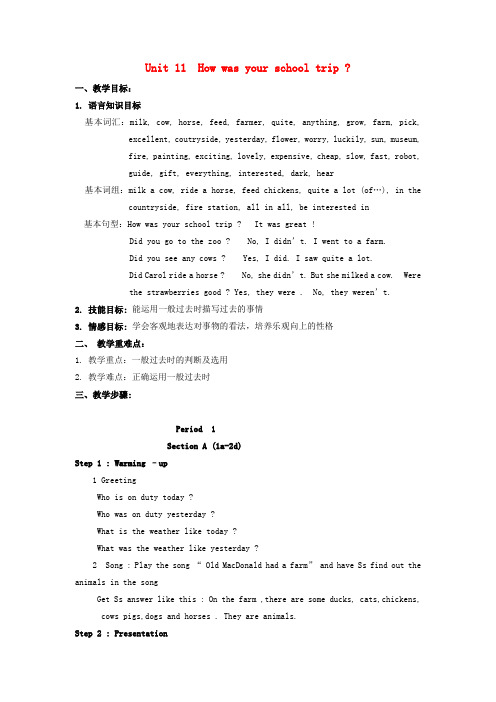
Unit 11 How was your school trip ?一、教学目标:1. 语言知识目标基本词汇:milk, cow, horse, feed, farmer, quite, anything, grow, farm, pick, excellent, coutryside, yesterday, flower, worry, luckily, sun, museum,fire, painting, exciting, lovely, expensive, cheap, slow, fast, robot,guide, gift, everything, interested, dark, hear基本词组:milk a cow, ride a horse, feed chickens, quite a lot (of…), in the countryside, fire station, all in all, be interested in基本句型:How was your school trip ? It was great !Did you go to the zoo ? No, I didn’t. I went to a farm.Did you see any cows ? Yes, I did. I saw quite a lot.Did Carol ride a horse ? No, she didn’t.But she milked a cow. Were the strawberries good ? Yes, they were . No, they weren’t.2. 技能目标: 能运用一般过去时描写过去的事情3. 情感目标:学会客观地表达对事物的看法,培养乐观向上的性格二、教学重难点:1. 教学重点:一般过去时的判断及选用2. 教学难点:正确运用一般过去时三、教学步骤:Period 1Section A (1a-2d)Step 1 : Warming –up1 GreetingWho is on duty today ?Who was on duty yesterday ?What is the weather like today ?What was the weather like yesterday ?2 Song : Play the song “ Old MacDonald had a farm” and have Ss find out the animals in the songGet Ss answer like this : On the farm ,there are some ducks, cats,chickens, cows pigs,dogs and horses . They are animals.Step 2 : Presentation1 Show a picture and tell Ss: This is also a farm. Last week Carol and his classmates had a school trip. They went to the farm. What did they do on the farm? How was their school trip?2 Show some pictures again and try to get the past tense verbs expressions according to the pictures.(1) Show the picture and the question(2) Ask one student to answer the question.(3) All students read it toghter.Q:Did he ride a horse?A:Yes, he did. He rode a horse.Q:Did he milk a cow?A:Yes, he did. He milked a cow.Q:Did he ride a horse?A :No, he didn’t .Did he feed chickens?Yes, he did. He fed chickens.Did you go to the zoo?No, I didn’t. I went to a farm.Did you see any cows ?Yes, I did. I saw quite a lot.Did they pick any strawberries on the farm ?Yes, they did .How were the strawberries?They were delicious.Were the strawberries good?Yes, they were.No, they weren’t.How was your school trip ?It was great.Were the strawberries good ?Yes ,they were.No, they weren’t.Step 3 ExercisesStep 4 : Practice (Listening and speaking)1a Match the phrses with the pictures.1b Listen and circle the three things Carol did on her school trip in 1a.1c Ask and an swer questions about Carol’s school trip.2a Listen and check the questions you hear.2b Listen again.Circle T for true or F for false2c Ask and answer questions about Carol’s visit to the farm.Step 5 :Tasks:1 Look at the pictures and practice the dialogueA:How was your school trip?B: It was …(boring/interesting/good/great…)A:What did you do on the school trip ?B:I went for a walk with my classmates.2 2d Role-play the conversation3.Groupwork: Make a survey. Ask your partners what they didlast week. Then give a reporter.Step 6 : Grammar Focus ( Get Ss read aloud )How was your school trip ? It was great !Did you go to the zoo ? No, I didn’t. I went to a farm.Did you see any cows ? Yes, I did. I saw quite a lot.Did Carol ride a horse ? No, she didn’t. But she milked a cow.Were the strawberries good ? Yes, they were . No, they weren’t.Step 6 Summary and Language pointsStep 7 Exercises :Period 2Section A (Grammar Focus-3b)Step 1:1 GreetingHow are you today ?How were you yesteday ?How was your last school trip ?2 Free talk :T : Do you want to know something about your classmates’ school trip ?Now Ask your partner :What did you do on your school trip ? Then fillin the following chart.Step 2 :Pre-task :1.Look at the pictures and fill in the blanks.2.Write the past forms of the following verbs.3. Check the past forms .Then ask Ss to summerize the rules of past forms ofthe regular verbs.Then explain the rules of past forms of the regular verbsStep 3 While-task 3a1 Ask Ss to read the letters in 3a .2 Ask Ss to complete Jim’s letter on the left and Bill’s reply on the right.3 Check the answers .Ask Ss to pay attention to the past tenst verbs.4 Explain the language points5 Read the letters together.Step 4: Post-task1. Challenge:Ask Ss to fill in the blanks according to the pictures.2 Check the answers. Ask Ss to read the answers one by one.3 Have a student read the letter out aloud.4 Ask Ss to read the letter several times. Try to recite it.5 Groupwork: Make up a story. Each student adds a sentence.If he or she can’tadd a sentenec .He or she must sing an English song.You can begin like this:Last week I visited my aunt’s house.____________________________________________________________________________________________________________________________Step 5 Language points and ExercisesPeriod 3Section B (1a-2c)Step 1:1 GreetingWhat did you do yesterday ?How were you yesterday ?2 Review: GamesUse your imagation and make up a story. Each student adds a sentence.If he or she can’t add a sentence,h e or she must sing an English song.Step 2 :Preparation 1a1 Match the activities with the pictures.2 Check the answersStep 2 :Listening 1b 1c1 Listen and answer the questions.1 How was Jane’s trip ?2 How was Tony’s trip ?2 Check the answers.3 Listen again. What did Jane and Tony do on their last school trip ? CheckTony or Jane.Step 3:Speaking 1d1 What was your last school trip like ?Discuss it with your partner with the following words.2 Teach Ss to read the following words :interesting difficult lovely slowexciting boring cool hotlucky large expensive terrible decilious great cheap fast3 Discuss like following conversation.A: I went to a farm on my last school trip.There are many animals on the farm.They are very lovely.B: That sounds great.A: How was your school trip ?B: It was __________A: How was the food there ?B: It was _____________A: How was the weather ?B: It was ___________Step 4: Prepatation2a Do the following words describe good things or bad things ? Put a √for good and an ×for bad . Leave a blank if they can mean both.Step 5 : Reading 2b,2c1 Read Helen’s and Jim’s diary entries and answer the questions in 2b2 Read the diaries again and complete the chart in 2cHow do Helen and Jim describe these things ?3 Check the answers .Ask Ss to pay attention to the past tenst verbs.4 Explain the language points5 Read the passages aloudStep 6 : Language points and exercises.Period 4Section B (3a-Self check )Step 1:1 GreetingHow are you feeling today?What did you do last night?How was your homework yesterday?2 Review : GamesUse your imagnation and make up a story. Each student adds a sentence.If he or she c an’t add a sentence,he or she must sing an English song. Step 2 : Preparation1.3a Look at the pictures of Bob’s school plete his diary entry.2. 3b Linda is Bob’s classmate. Complete her diary entry.Step 2 : Writing3c Now write a diary entry for your own school trip.Explain if you liked it or didn’t like it and why.Step 3 : Self-check1 Write more verbs and their past forms in each group.2 Complete the conversations with the correct forms of the verbs in the box.3 Check the answers4 Grammar: The Simple Past Tense。
人教新目标版英语七下Unit 11《How was your school trip》(Sectio

人教新目标版英语七下Unit 11《How was your school trip》(Section A 1a—1c)教学设计一. 教材分析人教新目标版英语七下Unit 11《How was your school trip》主要让学生通过学习和交流,掌握过去进行时态的用法,以及如何描述过去发生的事情。
本节课的主要内容是关于学生在学校旅行中的见闻和感受,通过听、说、读、写的方式,提高学生的语言运用能力。
二. 学情分析学生在学习本节课之前,已经掌握了基本的英语语法知识,具备一定的听、说、读、写能力。
但对于过去进行时态的运用,可能还存在一定的困难。
因此,在教学过程中,需要注重引导学生理解和运用过去进行时态。
三. 教学目标1.学生能够掌握过去进行时态的构成和用法。
2.学生能够通过听、说、读、写的方式,描述自己在学校旅行中的见闻和感受。
3.学生能够在真实情境中,运用过去进行时态进行交流。
四. 教学重难点1.过去进行时态的构成和用法。
2.如何引导学生运用过去进行时态描述过去发生的事情。
五. 教学方法1.情境教学法:通过设置真实的情境,让学生在实践中学习和运用过去进行时态。
2.任务型教学法:通过完成各种任务,引导学生积极参与课堂活动,提高语言运用能力。
3.互动式教学法:教师与学生、学生与学生之间的互动,激发学生的学习兴趣,提高课堂氛围。
六. 教学准备1.教学PPT:包含本节课的主要内容、图片、视频等。
2.教材:人教新目标版英语七下Unit 11。
3.录音机:用于播放听力材料。
4.教学卡片:用于操练和巩固所学内容。
七. 教学过程1.导入(5分钟)利用图片或视频展示学校旅行的场景,引导学生回忆学校旅行中的趣事,激发学生的学习兴趣。
2.呈现(10分钟)教师通过PPT呈现本节课的主要内容,包括单词、短语和句子。
同时,讲解过去进行时态的构成和用法,让学生初步感知和理解。
3.操练(15分钟)学生分组进行角色扮演,模拟学校旅行中的场景,用过去进行时态进行交流。
新目标版英语七年级下册Unit11Howwasyourschooltrip?(SectionA)含答案
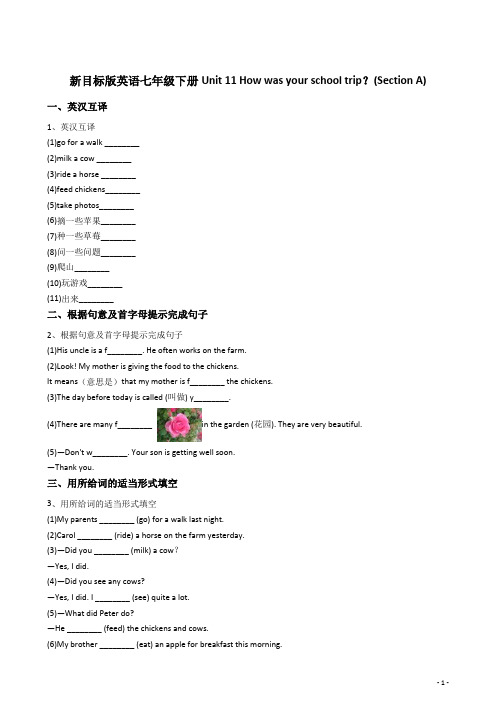
新目标版英语七年级下册Unit 11 How was your school trip?(Section A)一、英汉互译1、英汉互译(1)go for a walk ________(2)milk a cow ________(3)ride a horse ________(4)feed chickens________(5)take photos________(6)摘一些苹果________(7)种一些草莓________(8)问一些问题________(9)爬山________(10)玩游戏________(11)出来________二、根据句意及首字母提示完成句子2、根据句意及首字母提示完成句子(1)His uncle is a f________. He often works on the farm.(2)Look! My mother is giving the food to the chickens.It means(意思是)that my mother is f________ the chickens.(3)The day before today is called (叫做) y________.(4)There are many f________ in the garden (花园). They are very beautiful.(5)—Don't w________. Your son is getting well soon.—Thank you.三、用所给词的适当形式填空3、用所给词的适当形式填空(1)My parents ________ (go) for a walk last night.(2)Carol ________ (ride) a horse on the farm yesterday.(3)—Did you ________ (milk) a cow?—Yes, I did.(4)—Did you see any cows?—Yes, I did. I ________ (see) quite a lot.(5)—What did Peter do?—He ________ (feed) the chickens and cows.(6)My brother ________ (eat) an apple for breakfast this morning.(7)John ________ (study) English last Friday.(8)There ________ (be) two books on the table five minutes ago (以前).(9)They ________ (play) basketball yesterday afternoon.(10)The man ________ (stop) his car and ________ (buy) some strawberries yesterday morning.四、单选题4、It ___________ sunny yesterday. It ___________ rainy today.A、is; isB、is, wasC、was, isD、was; was5、—Jack, is there ___________ in today's newspaper?—No, nothing.A、anything importantB、something importantC、important anythingD、important something6、Yesterday my father ___________ his friends ___________ Tian'anmen Square (天安门广场).A、shows; aboutB、shows, aroundC、showed; aboutD、showed; around7、Could you say it again? I can't understand ___________ you are talking about.A、howB、whenC、whatD、which8、—___________ he go to Central Park?—Yes, he did.A、DidB、DoC、DoesD、Is9、It ___________ last week that the haze(雾霾) in Beijing caused many problems.A、reportsB、reportedC、is reportedD、was reported10、—Did Jim and Sue go to the party?—No, they ___________.A、didB、didn'tC、wereD、weren't11、—Do you need a new dictionary, Susan?—No, Mum. My uncle ___________ me one yesterday.A、buyB、buysC、boughtD、is buying12、—Who is it?—Me. I ___________ this photo when I was four.A、tookB、takesC、takeD、am taking13、Last Sunday, Carol and his friends ___________ some apples and ___________ them home.A、pick; tookB、picked; tookC、picked; takeD、pick, take五、根据汉语提示完成句子14、根据汉语提示完成句子(1)Don't ________(担心). The ________(太阳)is coming out.(2)My classmate helped ________(农民)________(种植)rice and ________(采;摘)apples last Sunday.(3)There are ________ ________ ________ ________ ________(相当多的马)on the farm.(4)—Did you learn ________ ________(优秀的东西)in the ________(农村)?—Yes, I did.(5)She was very ill, but ________(幸运地)she is now out of danger.六、按要求改写句子15、按要求改写句子(1)My school trip was pretty great last weekend.(对画线部分提问)________ was ________ school trip last weekend?(2)The twins played computer games yesterday.(改为一般疑问句,并作否定回答)—________ the twins ________ computer games yesterday?—No, ________ ________.(3)I saw cows last week. (改为一般疑问句,并作肯定回答)—________ you ________ cows last week?—Yes, ________ ________.(4)There were some chickens on the farm.(改为一般疑问句,并作肯定回答)—________ ________ ________ chickens on the farm?—Yes, ________ ________.(5)My family went fishing last Sunday.(对画线部分提问)________ ________ ________ family ________ last Sunday?七、补全对话16、补全对话Jim: Hey, Sally! I didn't see you last Saturday. Where were you?Sally:(1)________Jim: Why?Sally:(2)________Jim: Like what?Sally: Well, I cleaned my room. And I did my homework.Jim:(3)________Sally: Yes. How about you? What did you do?Jim:(4)________Sally: Wow! You had fun.Jim:(5)________八、阅读理解17、阅读理解We went on a school trip to New York. We had a good time. There were twenty-four students and three teachers. It was a five-day trip, and we visited some attractions (景点).We stayed at a hotel and six people had one room. We often had our meals out of the hotel—there were a number of restaurants nearby. We went around the city, and we were really given quite a lot of freedom(自由). So long as (只要) we were back to our rooms by 10 p.m., we could go where we wanted to. I was surprised at how safe I felt walking around New York in small groups. My friends and I enjoyed ourselves on the trip. I would like to advise it to anyone. If you decide to go, you will have a great time!(1)What is the message mainly about?A、A picnicB、A school trip.C、Ice-skatingD、Shopping.(2)How many people went on the trip?A、SixB、TenC、Twenty-fourD、Twenty-seven.(3)According to the passage, which of the following is NOT true?A、Six students lived in one room in the hotel.B、Students had to get back to the hotel by 10 pm.C、Students spent five days on the trip.D、Students had their meals in the hotel.(4)What did the author think of the trip?A、He had a good time.B、He wanted more freedom on the trip.C、He didn't want to come back.D、He was surprised at how dangerous New York was.(5)What does the underlined word "advise" mean in Chinese?A、说B、推荐C、建议D、喜欢答案解析部分一、英汉互译1、【答案】(1)去散步(2)给奶牛挤奶(3)骑马(4)喂鸡(5)照相(6)pick some apples(7)grow some strawberries(8)ask some questions(9)climb the mountains(10)play games(11)come out【解析】【分析】考查短语的英汉互译,注意名词要用复数形式。
七年级英语下册 Unit 11 How was your school trip重点单词及句型背诵、默写 (新版)人教新目标版
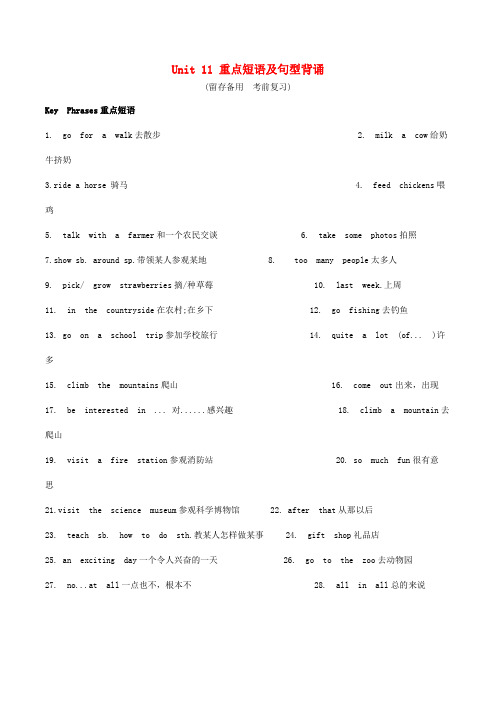
Unit 11 重点短语及句型背诵(留存备用考前复习)Key Phrases重点短语1. go for a walk去散步2. milk a cow给奶牛挤奶3.ride a horse 骑马4. feed chickens喂鸡5. talk with a farmer和一个农民交谈6. take some photos拍照7.show sb. around sp.带领某人参观某地 8. too many people太多人9. pick/ grow strawberries摘/种草莓 10. last week.上周11. in the countryside在农村;在乡下 12. go fishing去钓鱼13. go on a school trip参加学校旅行 14. quite a lot (of... )许多15. climb the mountains爬山 16. come out出来,出现17. be interested in ... 对......感兴趣 18. climb a mountain去爬山19. visit a fire station参观消防站 20. so much fun很有意思21.visit the science museum参观科学博物馆 22. after that从那以后23. teach sb. how to do sth.教某人怎样做某事 24. gift shop礼品店25. an exciting day一个令人兴奋的一天 26. go to the zoo去动物园27. no...at all一点也不,根本不 28. all in all总的来说29. learn a lot about ... 学了很多关....的知识Key Sentences 重点句型1. The farmer showed Carol around the farm. 这位农场主带领卡罗尔参观了农场。
2013最新新目标七年级英语下册Unit11-How-was-your-school-trip-单元词语归纳及语法精讲
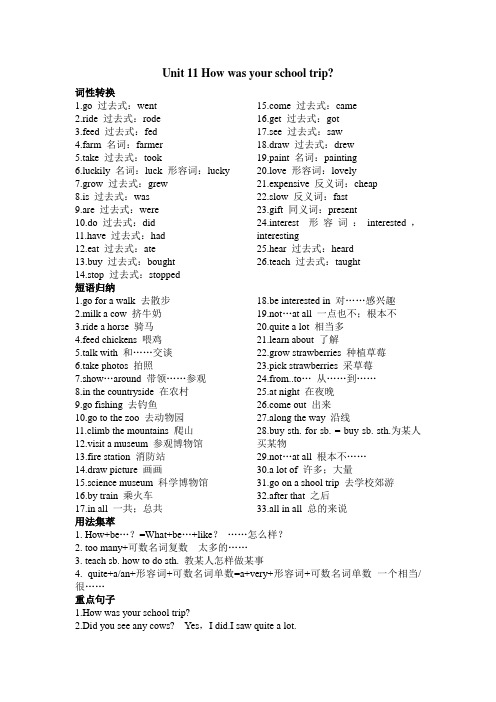
Unit 11 How was your school trip? 词性转换1.go 过去式:went2.ride 过去式:rode3.feed 过去式:fed4.farm 名词:farmer5.take 过去式:took6.luckily 名词:luck 形容词:lucky7.grow 过去式:grew8.is 过去式:was9.are 过去式:were10.do 过去式:did11.have 过去式:had12.eat 过去式:ate13.buy 过去式:bought14.stop 过去式:stopped e 过去式:came16.get 过去式:got17.see 过去式:saw18.draw 过去式:drew19.paint 名词:painting20.love 形容词:lovely21.expensive 反义词:cheap22.slow 反义词:fast23.gift 同义词:present24.interest 形容词:interested,interesting25.hear 过去式:heard26.teach 过去式:taught短语归纳1.go for a walk 去散步k a cow 挤牛奶3.ride a horse 骑马4.feed chickens 喂鸡5.talk with 和……交谈6.take photos 拍照7.show…around 带领……参观8.in the countryside 在农村9.go fishing 去钓鱼10.go to the zoo 去动物园11.climb the mountains 爬山12.visit a museum 参观博物馆13.fire station 消防站14.draw picture 画画15.science museum 科学博物馆16.by train 乘火车17.in all 一共;总共18.be interested in 对……感兴趣19.not…at all 一点也不;根本不20.quite a lot 相当多21.learn about 了解22.grow strawberries 种植草莓23.pick strawberries 采草莓24.from..to…从……到……25.at night 在夜晚e out 出来27.along the way 沿线28.buy sth. for sb. = buy sb. sth.为某人买某物29.not…at all 根本不……30.a lot of 许多;大量31.go on a shool trip 去学校郊游32.after that 之后33.all in all 总的来说用法集萃1. How+be…?=What+be…+like?……怎么样?2. too many+可数名词复数太多的……3. teach sb. how to do sth. 教某人怎样做某事4. quite+a/an+形容词+可数名词单数=a+very+形容词+可数名词单数一个相当/很……重点句子1.How was your school trip?2.Did you see any cows? Yes,I did.I saw quite a lot.3.Did you ride a horse? No,I didn’t.But I milked a cow.4.What did Tina do? She picked some strawberries.5.I visited my grandparents in the countryside.6.I went fishing every day.7.The farmer showed Tina around the farm.8.It got very cloudy and we worried it would rain.9.Then the guide taught us how to make a model robot.然后,导游叫我们怎样制作机器人模型。
七年级英语下册Unit11Howwasyourschooltrip说课稿(人教新目标版)
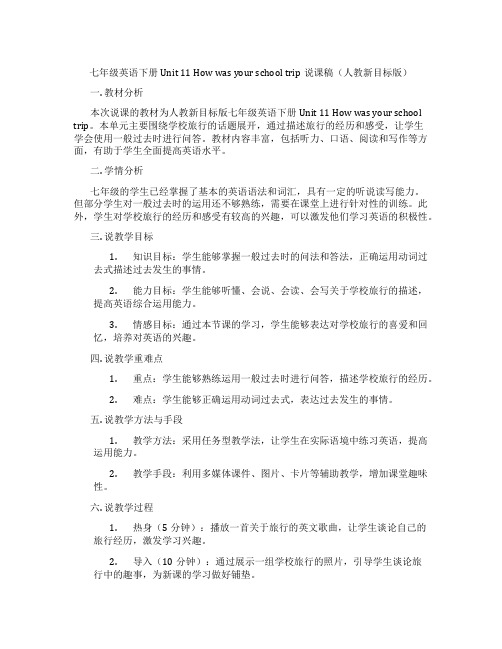
七年级英语下册 Unit 11 How was your school trip说课稿(人教新目标版)一. 教材分析本次说课的教材为人教新目标版七年级英语下册Unit 11 How was your school trip。
本单元主要围绕学校旅行的话题展开,通过描述旅行的经历和感受,让学生学会使用一般过去时进行问答。
教材内容丰富,包括听力、口语、阅读和写作等方面,有助于学生全面提高英语水平。
二. 学情分析七年级的学生已经掌握了基本的英语语法和词汇,具有一定的听说读写能力。
但部分学生对一般过去时的运用还不够熟练,需要在课堂上进行针对性的训练。
此外,学生对学校旅行的经历和感受有较高的兴趣,可以激发他们学习英语的积极性。
三. 说教学目标1.知识目标:学生能够掌握一般过去时的问法和答法,正确运用动词过去式描述过去发生的事情。
2.能力目标:学生能够听懂、会说、会读、会写关于学校旅行的描述,提高英语综合运用能力。
3.情感目标:通过本节课的学习,学生能够表达对学校旅行的喜爱和回忆,培养对英语的兴趣。
四. 说教学重难点1.重点:学生能够熟练运用一般过去时进行问答,描述学校旅行的经历。
2.难点:学生能够正确运用动词过去式,表达过去发生的事情。
五. 说教学方法与手段1.教学方法:采用任务型教学法,让学生在实际语境中练习英语,提高运用能力。
2.教学手段:利用多媒体课件、图片、卡片等辅助教学,增加课堂趣味性。
六. 说教学过程1.热身(5分钟):播放一首关于旅行的英文歌曲,让学生谈论自己的旅行经历,激发学习兴趣。
2.导入(10分钟):通过展示一组学校旅行的照片,引导学生谈论旅行中的趣事,为新课的学习做好铺垫。
3.新课呈现(15分钟):讲解一般过去时的问法和答法,示例说明如何用动词过去式描述过去发生的事情。
让学生跟读、模仿,确保正确掌握。
4.实践环节(15分钟):学生分角色扮演,模拟学校旅行的场景,运用一般过去时进行问答。
人教新目标版英语七下Unit 11《How was your school trip》(Sectio

人教新目标版英语七下Unit 11《How was your school trip》(Section B 2a)教学设计一. 教材分析人教新目标版英语七下Unit 11《How was your school trip》主要让学生通过学习关于学校旅行的相关话题,掌握一般过去时的疑问句和回答,以及如何描述过去的事情。
Section B 2a是一篇关于两个学生讨论他们学校旅行的对话,通过这篇对话,学生可以进一步理解一般过去时的运用,并能够运用所学知识进行实际对话。
二. 学情分析学生在学习本节课之前,已经掌握了一般现在时和一般过去时的基本结构,同时具备了一定的听说读写能力。
但对于如何运用一般过去时进行疑问句的提问和回答仍需加强练习。
此外,学生对于描述过去发生的事情还缺乏一定的词汇和表达方式,因此,在教学过程中,需要引导学生运用正确的词汇和句型进行描述。
三. 教学目标1.能听懂、会说、会读、会写关于学校旅行的相关词汇和句型。
2.能运用一般过去时进行疑问句的提问和回答。
3.能够描述过去发生的事情,并能够运用所学知识进行实际对话。
四. 教学重难点1.重点:掌握关于学校旅行的相关词汇和句型,运用一般过去时进行疑问句的提问和回答。
2.难点:如何引导学生运用正确的词汇和句型描述过去发生的事情。
五. 教学方法1.任务型教学法:通过设置各种任务,让学生在实际操作中运用所学知识。
2.情境教学法:创设各种情境,让学生在真实的环境中进行语言交流。
3.交际式教学法:引导学生进行小组讨论和对话,提高学生的口语表达能力。
六. 教学准备1.教学课件:制作与学校旅行相关的课件,包括图片、视频等。
2.教学道具:准备一些与学校旅行相关的实物道具,如地图、照片等。
3.练习册:准备与本节课相关的一般过去时的练习题。
七. 教学过程1.导入(5分钟)利用图片或视频引入学校旅行的主题,激发学生的兴趣,引导学生谈论他们曾经的学校旅行经历。
2.呈现(10分钟)展示2a的对话,让学生听懂对话内容,然后老师讲解对话中的重点词汇和句型。
人教新目标版英语七下Unit 11《How was your school trip》(Sectio

人教新目标版英语七下Unit 11《How was your school trip》(Section B 2b)教学设计一. 教材分析人教新目标版英语七下Unit 11《How was your school trip》(Section B 2b)主要讲述了四个同学分享他们学校旅行的经历。
本节课的主要语言点是过去式的疑问句和回答,以及一些表示旅行经历的词汇和短语。
通过本节课的学习,学生能够听懂、会说、会读、会写与旅行经历相关的句子,并能够运用所学知识进行简单的交流。
二. 学情分析七年级的学生已经掌握了一定的英语基础知识,能够听懂、会说、会读、会写一些简单的英语句子。
但是,对于过去式的疑问句和回答的运用还有一定的困难,需要通过大量的练习来巩固。
此外,学生对于一些表示旅行经历的词汇和短语还不够熟悉,需要在教学中进行引入和讲解。
三. 教学目标1.学生能够听懂、会说、会读、会写与旅行经历相关的句子。
2.学生能够运用过去式的疑问句和回答进行简单的交流。
3.学生能够掌握表示旅行经历的词汇和短语。
四. 教学重难点1.过去式的疑问句和回答的运用。
2.表示旅行经历的词汇和短语的掌握。
五. 教学方法1.任务型教学法:通过设定具体的情境,让学生在完成任务的过程中运用所学知识。
2.交际法:通过师生之间的互动,生生之间的交流,让学生在实际的语言环境中学习英语。
3.情境教学法:通过图片、视频等媒体手段,为学生创设真实、生动的情境,提高学生的学习兴趣。
六. 教学准备1.教学课件:制作与本节课内容相关的课件,包括图片、视频等媒体素材。
2.学案:为学生准备学习任务单,包括旅行经历的相关问题。
3.黑板:准备黑板,以便在课堂上进行板书。
七. 教学过程1.导入(5分钟)利用图片或视频展示不同类型的旅行,引导学生谈论自己的旅行经历,激发学生的学习兴趣。
2.呈现(10分钟)展示本节课的主要内容,让学生听懂四个同学分享旅行经历的故事。
在呈现过程中,引导学生关注过去式的疑问句和回答,以及表示旅行经历的词汇和短语。
2020年人教版新目标七下Unit 11 How was your school trip 单词和课
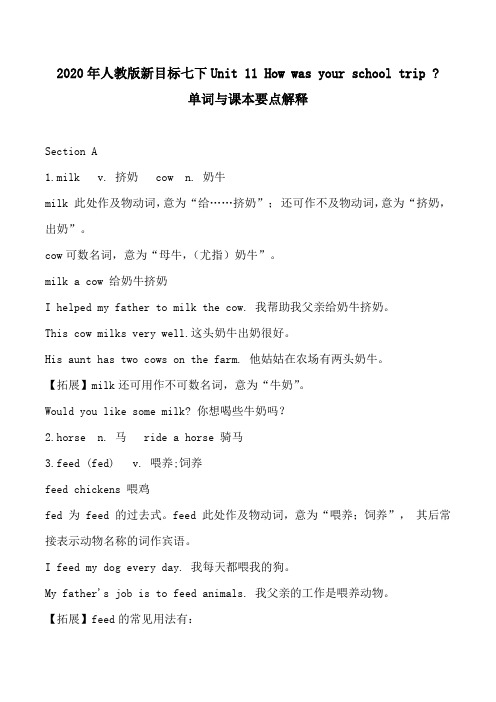
2020年人教版新目标七下Unit 11 How was your school trip ?单词与课本要点解释Section Ak v. 挤奶 cow n. 奶牛milk 此处作及物动词,意为“给……挤奶”;还可作不及物动词,意为“挤奶,出奶”。
cow可数名词,意为“母牛,(尤指)奶牛”。
milk a cow 给奶牛挤奶I helped my father to milk the cow. 我帮助我父亲给奶牛挤奶。
This cow milks very well.这头奶牛出奶很好。
His aunt has two cows on the farm. 他姑姑在农场有两头奶牛。
【拓展】milk还可用作不可数名词,意为“牛奶”。
Would you like some milk? 你想喝些牛奶吗?2.horse n. 马 ride a horse 骑马3.feed (fed) v. 喂养;饲养feed chickens 喂鸡fed 为 feed 的过去式。
feed 此处作及物动词,意为“喂养;饲养”,其后常接表示动物名称的词作宾语。
I feed my dog every day. 我每天都喂我的狗。
My father's job is to feed animals. 我父亲的工作是喂养动物。
【拓展】feed的常见用法有:①feed sth.to sb. /sth. 把某物喂给某人/某物Please feed some grass to the cow. 请给这头奶牛喂些草。
She fed milk to the baby. 她给婴儿喂了牛奶。
②feed on 以……为生,以……为食Sheep feed on grass. 绵羊以草为食。
③feed…on/with…用……喂……He feeds the dog on meat. 他用肉喂狗。
4.farmer n. 农民;农场主farm名词,意为“农场”;动词意为“耕种;干农活”。
人教新目标版英语七下Unit 11《How was your school trip》(Sectio
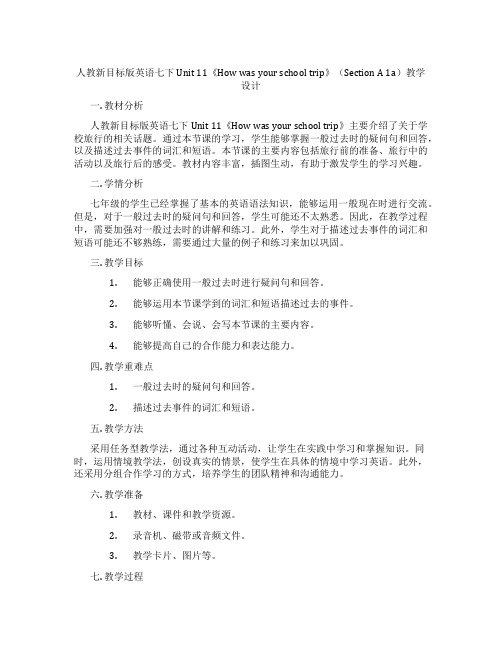
人教新目标版英语七下Unit 11《How was your school trip》(Section A 1a)教学设计一. 教材分析人教新目标版英语七下Unit 11《How was your school trip》主要介绍了关于学校旅行的相关话题。
通过本节课的学习,学生能够掌握一般过去时的疑问句和回答,以及描述过去事件的词汇和短语。
本节课的主要内容包括旅行前的准备、旅行中的活动以及旅行后的感受。
教材内容丰富,插图生动,有助于激发学生的学习兴趣。
二. 学情分析七年级的学生已经掌握了基本的英语语法知识,能够运用一般现在时进行交流。
但是,对于一般过去时的疑问句和回答,学生可能还不太熟悉。
因此,在教学过程中,需要加强对一般过去时的讲解和练习。
此外,学生对于描述过去事件的词汇和短语可能还不够熟练,需要通过大量的例子和练习来加以巩固。
三. 教学目标1.能够正确使用一般过去时进行疑问句和回答。
2.能够运用本节课学到的词汇和短语描述过去的事件。
3.能够听懂、会说、会写本节课的主要内容。
4.能够提高自己的合作能力和表达能力。
四. 教学重难点1.一般过去时的疑问句和回答。
2.描述过去事件的词汇和短语。
五. 教学方法采用任务型教学法,通过各种互动活动,让学生在实践中学习和掌握知识。
同时,运用情境教学法,创设真实的情景,使学生在具体的情境中学习英语。
此外,还采用分组合作学习的方式,培养学生的团队精神和沟通能力。
六. 教学准备1.教材、课件和教学资源。
2.录音机、磁带或音频文件。
3.教学卡片、图片等。
七. 教学过程1.导入(5分钟)通过展示一张美丽的旅行图片,引导学生谈论自己最喜欢的旅行。
同时,询问学生是否曾经去过某个地方,引导学生思考一般过去时的用法。
2.呈现(10分钟)展示本节课的主要内容,包括旅行前的准备、旅行中的活动以及旅行后的感受。
通过图片、卡片等形式,呈现本节课的重点词汇和短语。
3.操练(15分钟)采用分组合作的方式,让学生进行角色扮演,模拟旅行中的各种情景。
人教新目标版英语七下Unit 11《How was your school trip》(Sectio

人教新目标版英语七下Unit 11《How was your school trip》(Section B 2a)教案一. 教材分析《人教新目标版英语》七下Unit 11主要讨论关于学校旅行的经历。
Section B 2a是一个阅读材料,描述了两个学生对于他们学校旅行的不同看法。
通过阅读这个材料,学生可以了解和练习一般过去时的被动语态。
本节课的目标是通过阅读和讨论,提高学生的阅读理解能力和语言运用能力。
二. 学情分析七年级的学生已经掌握了基本的英语语法和词汇,对于一般过去时和被动语态有一定的了解。
他们在学习过程中,需要通过大量的练习来提高语言运用能力。
同时,他们对于学校旅行这样的主题比较感兴趣,可以通过讨论和分享,激发他们的学习兴趣。
三. 教学目标1.能够理解并朗读课文2a。
2.能够通过阅读和讨论,掌握一般过去时的被动语态。
3.能够运用所学知识,描述自己的一次学校旅行经历。
四. 教学重难点1.重点:通过阅读理解,掌握一般过去时的被动语态。
2.难点:如何运用一般过去时的被动语态,描述自己的学校旅行经历。
五. 教学方法采用任务型教学法,通过阅读、讨论、分享和实践,激发学生的学习兴趣,提高他们的语言运用能力。
六. 教学准备1.课文2a的复印件或幻灯片。
2.与学校旅行相关的图片或视频。
3.一份学校旅行的计划或经历。
七. 教学过程1.导入(5分钟)通过提问,引导学生回忆自己的一次学校旅行经历。
例如:“你们有没有去过什么有趣的地方?”、“你最喜欢学校旅行的哪个部分?”等。
2.呈现(5分钟)向学生展示课文2a,并让学生独立阅读。
在阅读过程中,引导学生关注一般过去时的被动语态。
3.操练(10分钟)让学生两人一组,互相练习使用一般过去时的被动语态,描述自己的学校旅行经历。
教师可以提供一些关键词或句子结构,帮助学生进行练习。
4.巩固(5分钟)通过小组讨论,让学生分享彼此的学校旅行经历。
鼓励他们使用一般过去时的被动语态进行描述。
最新人教版新目标七年级英语下册 Unit 11 How was your school trip课件

Unit 11 How was your school trip? 三、根据句意及首字母提示写单词。 (5A ×3分= 15 分) 第二课时(Section 2a~ 2d)
11.Tom doesn't feel well,and he doesn't want to eat a___. 12.We helped the farmers p_ __ strawberries on the farm. 13.My uncle g_ __ flowers in the green house. 14.Chen Bing was an e_ __ singer in Voice of China last year. 15.I've never been to big cities(城市).I am from c_ __. 四、用所给词的适当形式填空。(5×4分=20分) 16.My father __ __ (grow) a lot of strawberries last year. 17.We learned a lot about __ __ from these __ ____ .(farm) 18.____ Jack __ __ (clean) his room last weekend? 19.Bill __ __ (be not) at home last Sunday and he __ __ (not do) his homework. 20.They __ __ (watch) the stars last night.
excellent,grow,anything,farm,pick
6.Many people think Sun Yang is an __ __ swimmer. 7.They __ __ apples in the park yesterday. 8.I can't hear __ __ because I am reading. 9.My father __ __ a lot of rice last year. 10.We visited Uncle Wang's __ __ last week.
人教新目标版七年级英语下册中考考纲词汇详解: Unit 11 How was your school trip
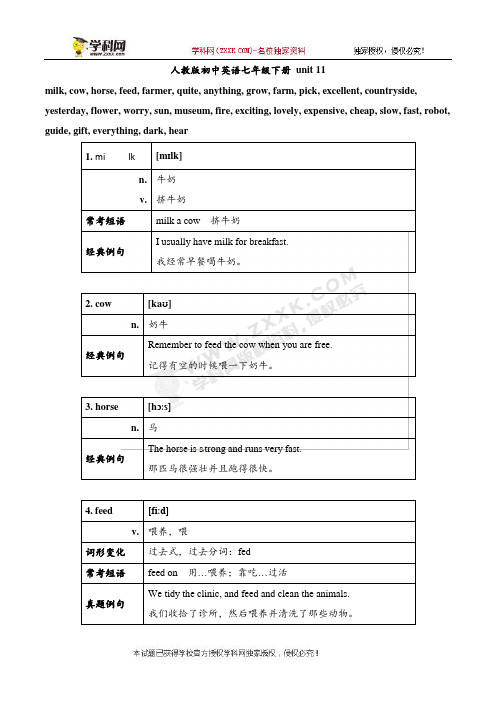
人教版初中英语七年级下册unit 11milk, cow, horse, feed, farmer, quite, anything, grow, farm, pick, excellent, countryside, yesterday, flower, worry, sun, museum, fire, exciting, lovely, expensive, cheap, slow, fast, robot, guide, gift, everything, dark, hear1. mi lk[mɪlk]n. v. 牛奶挤牛奶常考短语milk a cow 挤牛奶经典例句I usually have milk for breakfast.我经常早餐喝牛奶。
2. cow [kaʊ]n. 奶牛经典例句Remember to feed the cow when you are free.记得有空的时候喂一下奶牛。
3. horse [hɔːs]n. 马经典例句The horse is s trong and runs very fast.那匹马很强壮并且跑得很快。
4.feed [fiːd]v. 喂养,喂词形变化过去式,过去分词:fed常考短语feed on 用…喂养;靠吃…过活真题例句We tidy the clinic, and feed and clean the animals.我们收拾了诊所,然后喂养并清洗了那些动物。
5.farmer ['fɑːmə(r)]n. 农夫;农场主词形变化farm n.农场真题例句People should be grateful to a kindhearted farmer named Dan West.人们应该要对一个叫做丹﹒威斯特的好心农民心存感激。
6. quite [kwaɪt]adv. 相当,很常考短语quite a few 相当多真题例句Tom, a twelve – year – old boy, can speak English quite well.汤姆,一个12岁的男孩,能说英语说得很好。
2020年春人教新目标英语七年级下册期末知识点总结—Unit-11
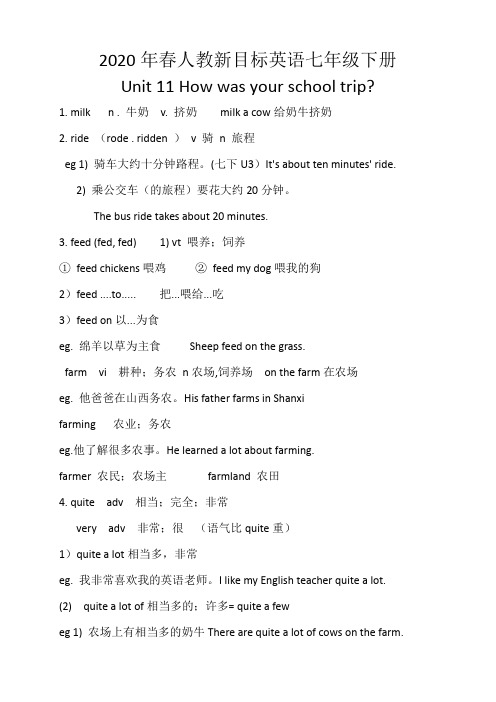
2020年春人教新目标英语七年级下册Unit 11 How was your school trip?1. milk n . 牛奶v. 挤奶milk a cow给奶牛挤奶2. ride (rode . ridden )v 骑n 旅程eg 1) 骑车大约十分钟路程。
(七下U3)It's about ten minutes' ride.2) 乘公交车(的旅程)要花大约20分钟。
The bus ride takes about 20 minutes.3. feed (fed, fed) 1) vt 喂养;饲养①feed chickens喂鸡②feed my dog喂我的狗2)feed ....to..... 把...喂给...吃3)feed on以...为食eg. 绵羊以草为主食Sheep feed on the grass.farm vi 耕种;务农n农场,饲养场on the farm在农场eg. 他爸爸在山西务农。
His father farms in Shanxifarming 农业;务农eg.他了解很多农事。
He learned a lot about farming.farmer 农民;农场主farmland 农田4. quite adv 相当;完全;非常very adv 非常;很(语气比quite重)1)quite a lot相当多,非常eg. 我非常喜欢我的英语老师。
I like my English teacher quite a lot. (2) quite a lot of相当多的;许多= quite a feweg 1) 农场上有相当多的奶牛There are quite a lot of cows on the farm.2)----你看到奶牛了吗?----是的,看到了。
我看到了相当多。
---Did you see any cows?---Yes, I did. I saw quite a lot.5. anything任何事物;某物everything所有事物;一切something某物nothing 什么都没有复合不定代词1)作主语时,视为单三。
七年级英语下册(新目标) Unit 11 教材听力原文及译文(优选.)
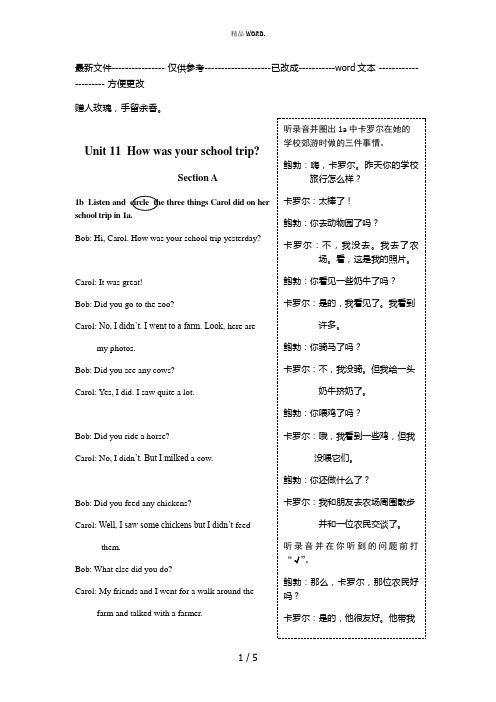
最新文件---------------- 仅供参考--------------------已改成-----------word 文本 --------------------- 方便更改 赠人玫瑰,手留余香。
Unit 11 How was your school trip?Section ABob: Hi, Carol. How was your school trip yesterday?Carol: It was great! Bob: Did you go to the zoo?Carol: No, I didn’t. I went to a farm. Look, here aremy photos.Bob: Did you see any cows? Carol: Yes, I did. I saw quite a lot.Bob: Did you ride a horse?Carol: No, I didn ’t. But I milked a cow.Bob: Did you feed any chickens?Carol: Well, I saw some chickens but I didn’t feedthem.Bob: What else did you do?Carol: My friends and I went for a walk around thefarm and talked with a farmer.听录音并圈出1a 中卡罗尔在她的学校郊游时做的三件事情。
鲍勃:嗨,卡罗尔。
昨天你的学校旅行怎么样? 卡罗尔:太棒了! 鲍勃:你去动物园了吗?卡罗尔:不,我没去。
我去了农场。
看,这是我的照片。
鲍勃:你看见一些奶牛了吗? 卡罗尔:是的,我看见了。
我看到许多。
鲍勃:你骑马了吗?卡罗尔:不,我没骑。
但我给一头奶牛挤奶了。
鲍勃:你喂鸡了吗?卡罗尔:哦,我看到一些鸡,但我没喂它们。
人教版新目标七年级下册unit11 How was your school trip_ Sectio

animals
great
Pre-reading
What’s the type of these passages?
日记的时态多用一般过去时!
2b
A. News.B. Diaries.C. Stories.D. Letters.
What do they talk about?
A school trip.
Unit11 How was your school trip?
(Section B 2a Reading
2021-2022学年人教版七年级英语下册教学课件★★
Lead in
Where did you go? What did you do or see?How did you feel?
D
B
( )3.Helen thought the school trip was ________.A.boring B.exciting C.terrible D.hot( )5. Helen thought the things in the gift shop were so ________.A.expensive B.lovely C.cheap D.good
Helen thought the trip was great.
Fast Reading
( )1.When did Helen go on a school trip? A.On July 15th. B.On June 5th. C.On July 5th. D.On June 15th.( )2.How did Helen go to the museum? A.By bus. B.By train. C.On foot. D.By bike.
新目标7年级下Unit11Howwasyourschooltrip

新目标7年级下Unit 11 How was your school trip?听力录音材料及答案I.1. M: Where did you go for your school trip?W: Well, we went to an aquarium.2. M: Did you borrow any interesting books from the library?W: Yeah, here they are. Five together.3. W: Hello, John! What did you do on your last day off?M: I had a bad cold and stayed in bed all day.W: Bad luck!4. M: Were there any visitors in the aquarium during the holiday?W: Er, not many, for the weather was terrible.5. W: Would you like to hang out with me this weekend?M: Why not? That sounds interesting!II.1. W: Tom, how was the movie?M: It was really a waste of time. I hope I didn’t go.2. M: Did you buy any souvenirs?W: I planned to buy some, but the things were too dear.3. W: Jerry invited m e to her birthday party, but I’m afraid I can’t go.M: Why not? That must be fun.W: I know, but I must get ready for the coming English exam. My English is so poor.4. W: Oh, man! Look at your arm! What happened to you?M: Nothing but a little car accident.5. M: Hello, is that Brown’s seafood restaurant? I want to book two seats.W: I am so sorry, sir. A woman called just now and booked the last two seats.M: Really? Just my luck.III.Dialogue 1W: Tony, where is your toy octopus from?M: Oh, J enny, it’s a gift from my uncle for my birthday.W: How funny it looks! Where did your uncle buy it?M: He didn’t buy it. He got it from one of his friends.Dialogue 2M: Hello, this is Mike. Is that Sue?W: Yes, this is Sue speaking. Are you at home now, Mike?M: No, I’m coming home now. Guess what, Sue! You may not believe. I met Jackie Chen in Wuxi, and got his autograph. We even took photos!W: Really! I can’t wait to have a look.M: But not now! We took 9 o’cl ock bus this morning. And I will be back home at 5 this afternoon.Come and check them then.W: That’s great! See you then.M: Bye.IV.M: On May Day, I went camping with some of my friends. We started early that morning. Tom didn’t go with us. He slept late. So we were five together. After we foun d a good place to set up our tents, we walked around and took several pictures. Later we found a river nearby.There were quite a lot of fish in the river. Toby and I caught some. We cooked them on the camp fire that night and had them with bread. That was a special dinner. We ate happily.We really had a fun camping.V.David: I’m David. Traveling is my favorite. I don’t care how long I stay outside. When I am out, I’m free from my work. That’s why I love it so much. So I’d like to go to the farth est place in March.Tina: I am new in the club. My name is Tina. I’m very excited about sleeping in a tent. I’m interested in all the routes, especially having a party and a barbecue. But I have no time before April. And I’m not sure if I’m strong enough t o climb mountains with a large backpack. So I will go to the nearest place.Mark: Hello, I’m Mark. I went to KuocangMountain last year. I don’t like to go again. This time I’m interested in climbing competition, because I am strong and good at climbing. I hope I can be the winner.Lucy: I am a middle school teacher. Lucy is my name. If I have a good rest at weekends, I will do the work better next week. I will have a two-day trip in April.Bob: I have been to many places in Zhejiang. So this year I plan to travel throughout Fujian. My friends often call me “Cray Bob”. Yes, it’s me, Cray Bob on road. That is how I enjoy my life.。
人教新目标英语七年级下Unit 11 How was your school tripSection

Unit 11 How was your school trip?Section B(2a-self check)导学案(第四课时)【学习目标】1. 复习并学习形容词,能区分褒义词和贬义词,能够通过阅读短文使学生学会如何使形容词进行评论,怎样发表自己感想。
并学会使用一般过去时态写日记。
2. 单词和短语:exciting, lovely, expensive, cheap, slow, fast, robot, guide, gift, everything,interested, dark, hear【学习过程】一、课前预习翻译下列短语或语块:1. go on a school trip___________________2. get there _____________________3. 慢的←→快的______________4. 昂贵的←→便宜的_____________5. 下棋____________________6. 坐火车_____________________7. model robot _______________ 8. 对…感兴趣_________________9. 总的说来__________________ 10. not…at all ___________________11. see sth.along the way________________ 12. teach sb. how to do sth. ____________13. teach sb. how to do sth _______________ 14. on the slow trian________________二、课上活动阅读理解1. 2a下列单词描述好事情还是坏事情?好事情打√,坏事情打×。
如果两种意思都有,留着空。
interesting ___ difficult ___ lovely___ slow___ exciting___boring___ cool ___ hot ___ lucky ___ large___ expensive __terrible ___ delicious ___ great ___ cheap ___ fast___2. 速读。
- 1、下载文档前请自行甄别文档内容的完整性,平台不提供额外的编辑、内容补充、找答案等附加服务。
- 2、"仅部分预览"的文档,不可在线预览部分如存在完整性等问题,可反馈申请退款(可完整预览的文档不适用该条件!)。
- 3、如文档侵犯您的权益,请联系客服反馈,我们会尽快为您处理(人工客服工作时间:9:00-18:30)。
II. 补全对话,每空一词。 out A: I went __________ with my friends by car yesterday. sounds interesting. B: That________ home A:When we came __________ ,my car didn’t work,and we had __________to walk home. did B: When _________ you come back? A: At about 10:00 at night.
Unit 11 How was your school trip?
Period 1:Section A 1a—1c (含Grammar Focus)
What do you usually do on your vacation?
go shopping
watch TV
play computer games read a book clean the room
shopped
Do you remember your last school trip? Where did you go?
What did you do?
How was your last trip?
Hale Waihona Puke 1aLet’s match the phrases with the pictures. Answers: e b a c f d Please write the infinitive of the past forms. Answers: went – go fed – feed milked – milk talked – talk rode – ride took – take
Groupwork
T:Suppose(假设) you took part in last school trip, now, please make up a conversation to say something about your trip. You can use the following useful structures: Where did you go? Was the food great? What did you do? Did you buy anything? How was your school trip? Did you go…?
Write a short passage about your trip. you can begin like this: I had a great school trip.I went to…
Listening
☆ Before listening. Please look at the pictures carefully and read the conversation in the picture. Then have a competition and find the best listener. ☆ While listening. Please try to get the main information . circle the three things . Then check the answers and together. ☆ After listening. Please read the conversation clearly and loudly, try to understand the target languages.
go have take eat see buy take feed
went had took ate saw bought took fed
play watch clean decide practice study stop shop
played watched cleaned decided practiced studied stopped
I. 用be动词的适当形式填空。 was 1.Tom _____late for school yesterday and his teacher was angry. _____ was 2.I ______ in the same class as Mary last year. were 3.There _____a lot of flowers in the garden last summer. are 4.The leaves _____ green in spring. was 5.The wind ______ strong last night.
